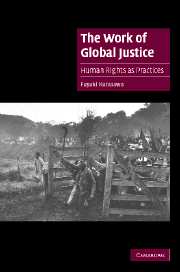Book contents
- Frontmatter
- Contents
- List of figures
- Preface
- Introduction: Theorizing the work of global justice
- 1 A message in a bottle: on bearing witness
- 2 The healing of wounds: on forgiveness
- 3 Cautionary tales: on foresight
- 4 The stranger's keeper: on aid
- 5 Cosmopolitanism from below: on solidarity
- Conclusion: Enacting a critical cosmopolitanism
- References
- Index
- Cambridge Cultural Social Studies
1 - A message in a bottle: on bearing witness
Published online by Cambridge University Press: 01 December 2009
- Frontmatter
- Contents
- List of figures
- Preface
- Introduction: Theorizing the work of global justice
- 1 A message in a bottle: on bearing witness
- 2 The healing of wounds: on forgiveness
- 3 Cautionary tales: on foresight
- 4 The stranger's keeper: on aid
- 5 Cosmopolitanism from below: on solidarity
- Conclusion: Enacting a critical cosmopolitanism
- References
- Index
- Cambridge Cultural Social Studies
Summary
The paradox here is that if the only one bearing witness to the human is the one whose humanity has been wholly destroyed, this means that the identity between human and inhuman is never perfect and that it is not truly possible to destroy the human, that something always remains. The witness is that remnant.
(Agamben 1999: 34)Introduction
Our examination of the practices that constitute global justice begins with bearing witness, for testimonial acts undergird and create the ethical and socio-political conditions under which the other modes of practice considered in this book can exist. Indeed, without the labour of groups and persons struggling to give voice and respond to mass abuses of both civil-political and socio-economic rights, the pursuit of global justice would rapidly grind to a halt. As we shall see in the chapters to follow, bearing witness to past, present and future structural injustices and atrocities is necessary for forgiveness to be envisaged, for farsighted warnings about potential catastrophes to be heeded, for aid to those in need to be forthcoming and for solidarity with distant others to be built.
Aside from grounding other modes of practice, bearing witness merits attention in its own right. Its prevalence and impact today can hardly be ignored, for we inhabit what commentators have variously described as ‘the era of the witness’ (Wieviorka 1998) and ‘the age of testimony’ (Felman and Laub 1992: 206).
- Type
- Chapter
- Information
- The Work of Global JusticeHuman Rights as Practices, pp. 23 - 55Publisher: Cambridge University PressPrint publication year: 2007
- 1
- Cited by



